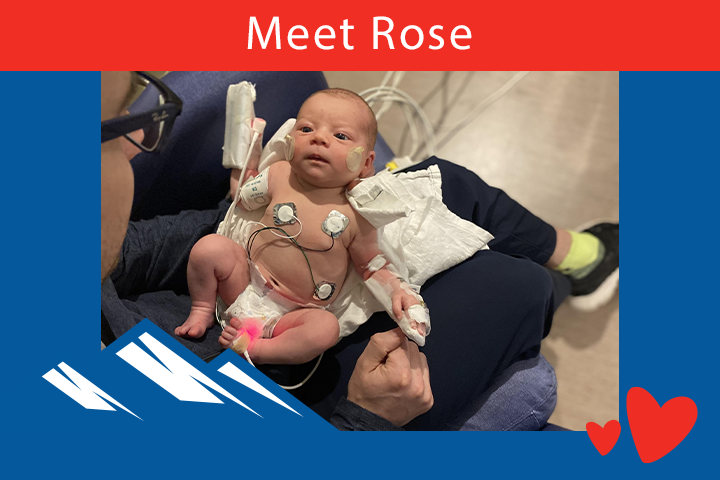Just a week after Maria and Zach welcomed their sweet baby Rose to the world, she stopped feeding properly. They saw their family doctor and everything seemed fine, but then one night, things took a turn. Maria was in the newborn sleep-deprivation haze but remembers Zach urging her to take Rose to the Alberta Children’s Hospital – something was wrong. Maria felt like she was overreacting, but that changed quickly when she and the triage nurse in the Emergency Department unwrapped Rose from her cozy car seat and saw she was turning blue.
“The nurse called the trauma team and before I knew it, about 10 people were surrounding my tiny baby,” says Maria. Rose had no detectable femoral pulses – her heart was not properly pumping blood to the rest of her body. “It’s a crazy thing when you can pinpoint the exact worst moment of your entire life. For me, it was seeing Rose on that hospital bed, surrounded by medical staff, not knowing if she’d make it through the next hour.”
A social worker, who Maria calls “her rock”, kept her grounded as she waited for Zach to arrive. They sat nearby to let the critical care specialists work on Rose, though close enough that Maria could hear her baby crying: “It was the best sound in the world because it meant she was still breathing.” Pediatric cardiologist Dr. Deborah Fruitman was able to determine there was a mass in Rose’s heart and later, that it was a blood clot called a left atrial thrombus, putting Rose at risk of a stroke. “Dr. Fruitman was the calm, confident leader we desperately needed,” says Maria. “She walked us through everything they were doing to help Rose, step by step.”
After Rose was stabilized, she spent four days in the Pediatric Intensive Care Unit (PICU) while specialists from cardiology, hematology, rheumatology and neurology worked around the clock find out more about the clot. Thanks to the amazing “detective work” of rheumatologist Dr. Nicole Johnson, Maria and Zach learned Rose had high levels of anti-cardiolipin antibodies. Through bloodwork and tests on Maria, Dr. Johnson’s suspicion was confirmed – these antibodies had passed from mother to baby during pregnancy. Rose’s clot was a super rare occurrence, with only 13 other reported cases like this in the world.
The clot could be managed with injections of a blood thinner twice a day for the foreseeable future. At first, it was Unit 2 staff doing these shots for Rose, however the nurses spent hours helping Maria practice injections on an orange until she felt confident enough to carry on treatment at home for the next seven months.
Today, Rose is a healthy, happy two-year-old, who Maria describes as “confident, ferocious and sassy.” She still has regular follow-up appointments with both Drs. Fruitman and Johnson, but is doing great. “I’m forever grateful for the care we continue to receive from the doctors and the amazing nurses,” says Maria. “This experience showed me the incredible resilience of my little girl and how lucky we are to have such an amazing children’s hospital. We owe our daughter’s life to this place.”


